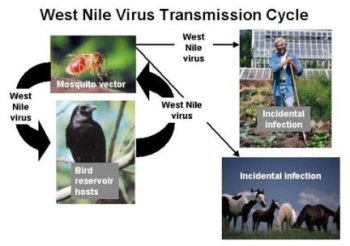Fight the bite! Knowing the symptoms and transmission cycle of West Nile Virus can help you stay safe

Warm weather means more time outside... and more mosquitoes. Infected mosquitoes spread West Nile virus (WNV) that can cause serious, life-altering disease.
Avoid the danger and those annoying bites — use an effective insect repellent. It’s also time to fix those screens and empty water-holding containers around the yard.
What is West Nile Virus?
West Nile virus (WNV) is a mosquito-borne virus that can cause mild illness (West Nile fever) or severe symptoms (encephalitis or meningitis — an inflammation of the brain) in humans and other animals.
Transmission of West Nile Virus
People primarily get West Nile from the bite of a mosquito that is infected with WNV.
Mosquitoes become infected with WNV when they feed on infected birds that carry the
virus in their blood. In rare instances, WNV can be transmitted from person to person via blood transfusion, organ transplant, breast milk or through the placenta.
In Michigan the most common species of mosquito associated with WNV transmission is the Culex sp. These are mosquitoes that primarily bite birds and breed in small collections of stagnant water.

The virus attacks the central nervous system and can weaken the immune system and muscles. Once the virus is in the bloodstream, it can multiply and inflame brain tissue, which can lead to encephalitis or meningitis.
Symptoms of West Nile Virus
The risk of getting West Nile encephalitis is limited to persons in areas where virus activity occurs, and the risk is higher in persons 50 years of age or older. The chances you will become severely ill from any one mosquito bite are extremely small. Even in areas where mosquitoes do carry the virus, very few mosquitoes are infected.
Most people infected with West Nile virus have no symptoms of illness, but some may become ill three to 15 days after the bite from an infected mosquito. Studies have shown that about one in four infected persons will experience mild illness with fever, headache, and body aches, sometimes with a skin rash and swollen lymph glands.
Less than 1 percent of people who get bitten and become infected with West Nile virus will develop a severe illness like encephalitis or meningitis. More severe infection may be marked by headache, high fever, stiff neck, disorientation, convulsions, muscle weakness, and paralysis. In a few cases, mostly among the elderly, death may occur.
We are discovering that the more that is learned about WNV, the more complex the disease cycle is found to be. However, there are several recurring WNV themes:
- Corvid species of birds (crows, ravens and blue jays) are sensitive indicators of viral presence in a particular geographic area.
- Culex species of mosquitoes are important in the transmission of WNV to humans.
- Hot, dry weather conditions are favorable for amplification of the virus cycle in birds and mosquitoes, particularly in urban/suburban areas.
- August and September are the months of greatest risk to humans for becoming infected with WNV in Michigan.
- WNV will likely remain an issue in Michigan, causing the need for annual prevention efforts
Resources
- Washtenaw County Public Health WNV information
- CDC West Nile Virus information
- Archived West Nile Virus Data for Washtenaw County
To report a dead bird, please call the WNV hotline: 734-544-6750.

